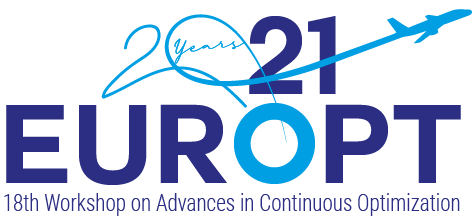FB-06: Advanced Optimization Methods II
Stream: Advanced Optimization Methods
Room: Moreau
Chair(s): Jacek Gondzio
New Bregman proximal type algorithms for solving DC optimization problems
Shota Takahashi, Mituhiro Fukuda, Mirai Tanaka
Difference of convex (DC) optimization problems have objective functions that are differences of two convex functions. A proximal DC algorithm (PDCA) solves large-scale DC optimization problems, assuming the L-smoothness of objective functions. In this talk, using the Bregman distances, we propose a Bregman proximal DC algorithm (BPDCA) that does not require the L-smoothness. In addition, accelerating the BPDCA by the extrapolation technique, we propose the Bregman proximal DC algorithm with extrapolation (BPDCAe).
Parameter tuning of linear programming solvers
Nikolaos Ploskas
Linear programming solvers have a large set of parameters that allow users to control algorithmic aspects. Tuning solver options may have a considerable impact on solver performance. Previous efforts to tune solver parameters have used derivative-free optimization algorithms. In this work, we apply various derivative-free optimization solvers in order to find high quality tuning parameters for linear programming solvers. This work investigates how sensitive linear programming solvers are to a parameter tuning process. We present extensive computational results.
A modified barrier method with algebraic multigrid solver
Alexander Brune, Michal Kocvara
The Penalty-Barrier Multiplier (PBM) method, originally introduced by R. Polyak and later studied by Ben-Tal and Zibulevsky and others proved to be an efficient tool for solving very large scale optimization problems. The numerical bottleneck of the method (as of similar methods) lies in the repeated solution of a very large linear systems. We will show that for problems resulting from topology optimization of mechanical structures on irregular finite element meshes, algebraic multigrid can be used to solve problems of large dimension, unsolvable by direct methods.
A new stopping criterion for PCG applied in IPM
Filippo Zanetti, Jacek Gondzio
When Conjugate Gradient Method is used as a linear solver in the Interior Point Method, the attention is usually placed on accelerating its convergence by designing appropriate preconditioners, and the PCG is applied as a black box solver. We design and analyze a new specialized termination criterion for PCG applied in the context of IPMs. The new criterion has been tested on a set of linear and quadratic optimization problems including compressed sensing and image processing and has demonstrated consistent and significant improvements in terms of CG iterations and computational time.
